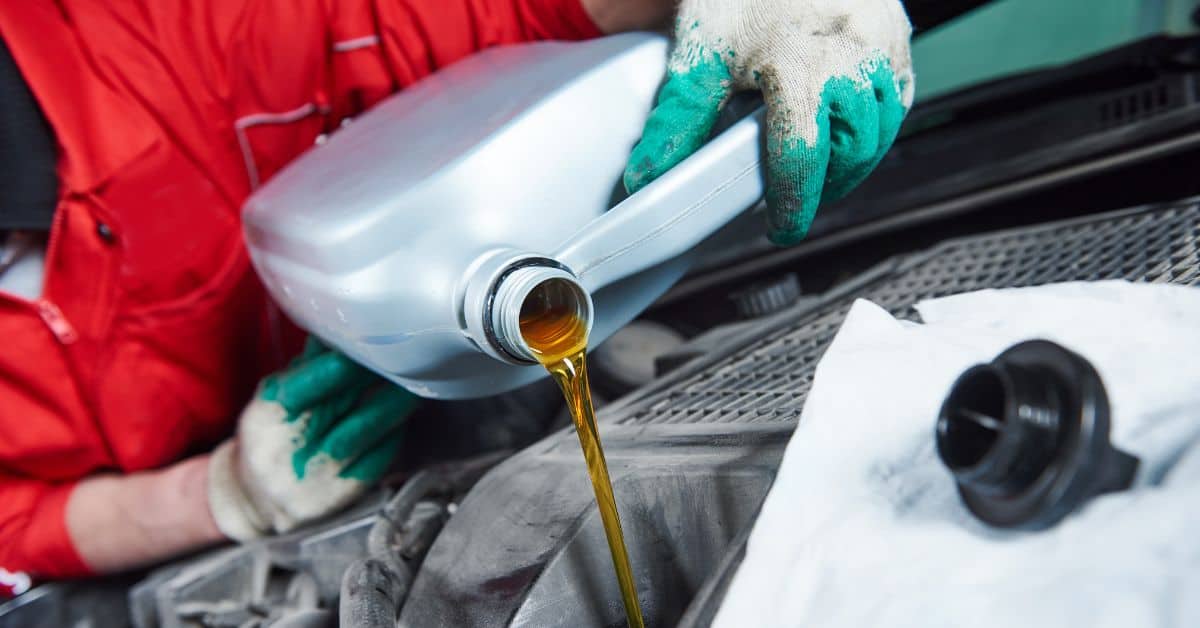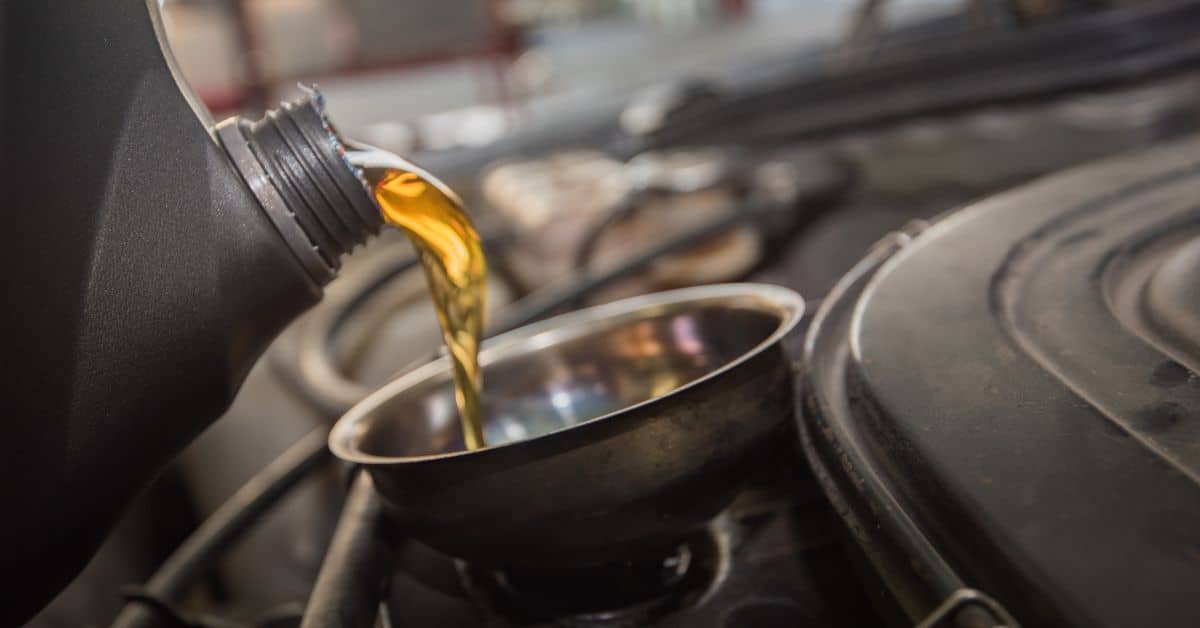Does Car Engine Oil Evaporate? (Explained!)
Some liquids slowly evaporate at room temperature; others need to be hotter. Does engine oil evaporate? What happens when a car engine uses up oil?

Engine oil certainly evaporates in a car engine. Some of the engine oil turns into vapor and escapes, making the oil thicker and less effective. At room temperature, engine oil won’t evaporate the way water and other liquids do.
I once left a bottle of engine oil open in my garage for a long time. It got dusty, so I didn’t use it, but the oil didn’t evaporate. I always check my oil often because a mechanical problem might make your car burn oil faster than normal.
Evaporation at Room Temperature
Not all liquids evaporate at room temperature. Car engine oil won’t evaporate if you leave it in a room in an open container. If you leave a glass of water in a room, it will slowly evaporate, but engine oil will not.
However, engine oil can evaporate in your engine. This is part of why you have to replace it regularly. You can destroy your engine if it seizes up due to a lack of oil.
Does Spilled Engine Oil Evaporate?
Even if it is spilled on the ground rather than left in an open container, it won’t evaporate. Engine oil doesn’t evaporate at room temperature.
Engine Oil Can Decrease Faster Than Expected
Using the stick to check your engine oil often is important. Your engine might start using oil faster than normal if there is a problem. An engine that burns oil quickly might run out of oil before the owner checks the oil again.
If your engine burns oil faster than normal, this may be because you have a leak and maybe because of increased evaporation. A problem that makes your engine lose oil faster than normal may get worse over time if you don’t fix it.

Volatility Rate
The volatility rate is how quickly a liquid evaporates. A volatile liquid evaporates quickly.
Volatility refers to a few different things. For example, if the price of something is volatile, that means it changes quickly.
Not all engine oil is equally volatile. You can get engine oil that evaporates more slowly than most other engine oil.
Engine Oil Gets Thicker as it Evaporates
Pure water only contains H20 and not other molecules. However, engine oil has a mix of heavier and lighter molecules in it. The lighter molecules evaporate faster, leaving the heavier molecules behind.
While water may stay the same after a lot of it evaporates, oil changes. The oil becomes thicker when the heavier molecules are gone and the lighter molecules are still there. Eventually, the oil becomes so thick and viscous that it doesn’t lubricate your engine properly.
Overly Thick Engine Oil is Dangerous
The thicker the engine oil gets, the more poorly it performs. Your oil also evaporates faster as it thickens. Eventually, your engine might seize up and wreck your car.
Minor and Major Problems
Even if your engine doesn’t seize up, thick oil will cause other problems. Your engine won’t perform as well, will burn more fuel per mile, and will have trouble starting in cold weather.
Thick engine oil also increases engine deposits. These carbon deposits build up in your engine and prevent it from working properly. Certain parts of the engine such as the injectors, cylinder walls, and intake valves are vulnerable to these deposits.
What Happens When an Engine Burns Oil?
Sometimes, an engine will start burning oil a lot faster than normal. This is dangerous because the oil might get too low before the owner notices what is going on.
Worn-out piston rings are one of the biggest causes. A piston ring creates a seal that prevents engine oil from entering the combustion chamber and burning. If the grooves on the rings are no longer flat, they won’t work properly.
The valve stems or valve guides might also have worn out. A stuck PVC valve can also make your engine burn oil.

How Do You Prevent the Engine From Burning Oil?
One of the simplest ways is switching to synthetic oil. Modern synthetic oil performs better than earlier forms of engine oil.
Synthetic oils are heat resistant, so they won’t evaporate or thicken nearly as quickly. You won’t need to add new oil nearly as often if you use synthetic oil.
Suggested Article: How Hot Does Engine Oil Get?
Should You Use Lower Viscosity Oil in Colder Temperatures?
Either higher or lower viscosity oil is better in some situations. Check what your manufacturer recommends for your car.
A lot of the time, a certain viscosity is right for your vehicle, regardless of the season. Other times, they might recommend 5W-20 oil in cold weather and 10W-20 oil in warm weather.
Advantages of Low Viscosity Oil
Low-viscosity oil flows easily, and high-viscosity oil flows quickly. This makes low-viscosity oil better in cold temperatures where the cold makes it harder for engine oil to flow. With high-viscosity oil, you might have trouble starting your car in cold weather.
Advantages of High Viscosity Oil
High-viscosity oil protects your engine better at hotter temperatures. The wear and tear on your engine might be lower with high-viscosity engine oil. Different vehicles require different engine oils.
Older Engine Oil Loses its Viscosity
If oil has been in your engine for a long time, it will have partly evaporated. This will make the oil thicker and more viscous. Eventually, the oil will be too vicious to flow around your engine properly, making your engine perform poorly or worse.
Key Takeaways
- Engine oil doesn’t evaporate at room temperature the way water does. However, it evaporates in an engine due to the higher heat.
- Check your engine oil regularly. If you don’t check it often, and your car starts burning oil faster than usual, your oil might run out and your engine might seize up and break.
- Sometimes, mechanical problems can make your engine burn oil faster than normal. A worn-out piston ring is a common cause.
- When engine oil evaporates, it becomes thicker, because the lighter molecules evaporate and the heavier molecules stay behind.
- Thick engine oil leads to poor fuel efficiency, poor performance, difficulty starting the engine, and eventually serious engine damage.
